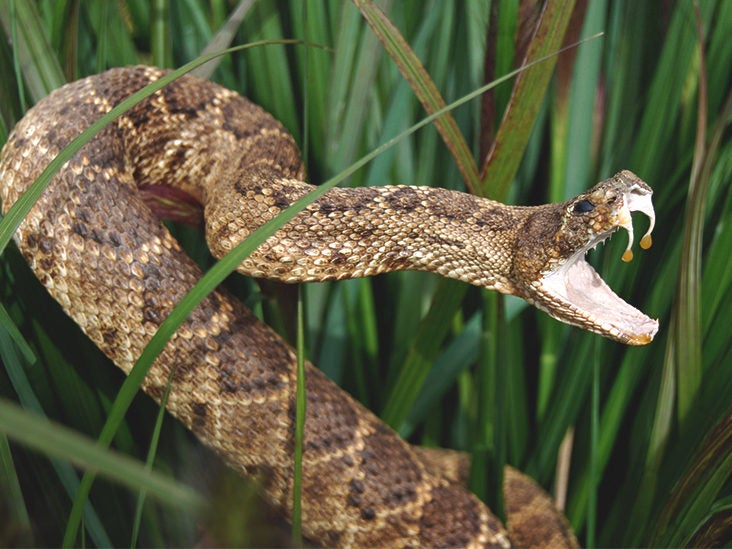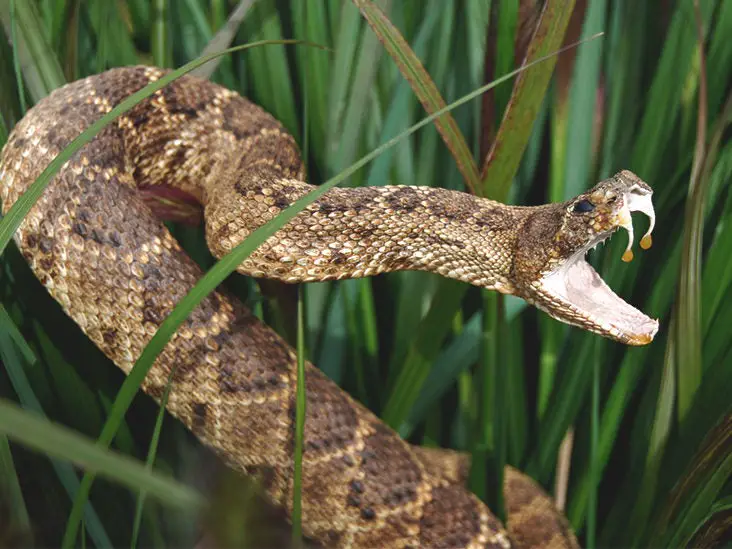Rattlesnakes are well-known for their venomous bites, but just how dangerous are they? When it comes to the question of whether a rattlesnake bite is deadly, the answer is not a simple one.
While some rattlesnake bites can be fatal, many are not. The severity of the bite depends on several factors, including the amount and potency of the venom, the location of the bite, and the individual’s health and reaction to the venom. In this article, we will explore the potential dangers of rattlesnake bites and what to do if you or someone you know is bitten.
Yes, a rattlesnake bite can be deadly if left untreated. The venom of a rattlesnake can cause severe tissue damage, internal bleeding, organ failure, and even death. It is important to seek immediate medical attention if you or someone you know is bitten by a rattlesnake. Antivenom is the most effective treatment for a rattlesnake bite, and early administration can save lives.

Is a Rattlesnake Bite Deadly?
Rattlesnakes are venomous snakes that are found in various parts of the world. A rattlesnake bite can be deadly if not treated immediately. In this article, we will discuss whether a rattlesnake bite is deadly, the symptoms of a rattlesnake bite, and what to do if you are bitten by a rattlesnake.
Understanding Rattlesnake Venom
Rattlesnake venom is a complex mixture of enzymes and proteins that are designed to immobilize and kill prey. The venom is delivered through the rattlesnake’s fangs, which are located in the front of its mouth. When a rattlesnake bites, it injects venom into the victim’s bloodstream.
The amount of venom injected depends on the size and maturity of the rattlesnake, as well as the location of the bite. Some rattlesnakes are capable of injecting a large amount of venom, which can be deadly to humans.
Symptoms of a Rattlesnake Bite
The symptoms of a rattlesnake bite can vary depending on the amount of venom injected, the location of the bite, and the victim’s sensitivity to the venom. Some of the common symptoms of a rattlesnake bite include:
- Pain and swelling at the site of the bite
- Bleeding and bruising
- Nausea and vomiting
- Dizziness and fainting
- Difficulty breathing
In severe cases, a rattlesnake bite can lead to organ failure and death.
What to Do If You Are Bitten by a Rattlesnake
If you are bitten by a rattlesnake, it is important to seek immediate medical attention. Call 911 or go to the nearest hospital as soon as possible. While waiting for medical help to arrive, there are a few things you can do to reduce the risk of complications:
- Stay calm and still
- Remove any tight clothing or jewelry near the bite site
- Keep the affected limb immobilized and at or below heart level
- Avoid applying ice or a tourniquet to the bite site
It is important to remember that rattlesnake bites can be deadly, and immediate medical attention is crucial.
Benefits of Rattlesnakes
While rattlesnakes can be dangerous to humans, they play an important role in the ecosystem. Rattlesnakes help to control rodent populations, which can cause damage to crops and spread diseases. Rattlesnakes are also an important food source for predators such as hawks, eagles, and coyotes.
Rattlesnake vs. Other Snakes
Rattlesnakes are often confused with other types of snakes, such as garter snakes or bull snakes. However, there are a few key differences between rattlesnakes and other snakes. Rattlesnakes have a distinctive rattle on the end of their tail, which they use to warn predators and prey. Rattlesnakes also have a triangular-shaped head and vertical pupils, while other snakes have round pupils and a more oval-shaped head.
Conclusion
In conclusion, a rattlesnake bite can be deadly if not treated immediately. Understanding the symptoms of a rattlesnake bite and knowing what to do if you are bitten can help to reduce the risk of complications. While rattlesnakes can be dangerous to humans, they play an important role in the ecosystem and should be respected and left alone in their natural habitat.
Frequently Asked Questions
Here are some common questions people have about rattlesnake bites:
What should I do if I get bitten by a rattlesnake?
If you get bitten by a rattlesnake, seek medical attention immediately. Do not try to suck out the venom or cut the wound, as this can make the situation worse. Try to stay calm and keep the affected limb still to slow the spread of the venom. The faster you can get medical help, the better your chances of a full recovery.
Can all rattlesnake bites be deadly?
No, not all rattlesnake bites are deadly. In fact, most rattlesnake bites are not fatal if treated promptly. However, even non-fatal bites can cause serious complications, so it’s important to seek medical attention as soon as possible after being bitten.
What are the symptoms of a rattlesnake bite?
The symptoms of a rattlesnake bite can include pain, swelling, and discoloration around the bite area, as well as nausea, vomiting, and difficulty breathing. In severe cases, the bite can cause paralysis, seizures, and even death. If you suspect you have been bitten by a rattlesnake, seek medical attention immediately.
How can I avoid getting bitten by a rattlesnake?
The best way to avoid getting bitten by a rattlesnake is to be aware of your surroundings when hiking or spending time outdoors. Wear long pants and boots, and avoid walking through tall grass or brush where snakes may be hiding. Listen for the sound of a rattlesnake’s rattle, which is a warning sign that the snake feels threatened. If you encounter a rattlesnake, give it plenty of space and back away slowly.
What treatments are available for rattlesnake bites?
The most common treatment for rattlesnake bites is antivenom, which is a medication that helps neutralize the venom in the bloodstream. Other treatments may include pain medication, antibiotics to prevent infection, and wound care to prevent tissue damage. The specific treatment will depend on the severity of the bite and the individual’s medical history. It’s important to seek medical attention as soon as possible after being bitten by a rattlesnake.
What Happens if a Rattlesnake BITES You?
In conclusion, a rattlesnake bite can be deadly if left untreated. However, with prompt medical attention, most individuals who are bitten by a rattlesnake can recover fully. It is important to recognize the symptoms of a rattlesnake bite and seek medical attention immediately.
Prevention is key in avoiding rattlesnake bites. Stay aware of your surroundings, wear appropriate clothing and footwear when hiking or exploring areas known to have rattlesnakes, and avoid disturbing or provoking these snakes.
Overall, it is important to respect the danger that rattlesnakes can pose, but also understand that with proper precautions and medical attention, a rattlesnake bite does not have to be deadly. Stay informed, stay cautious, and stay safe.


